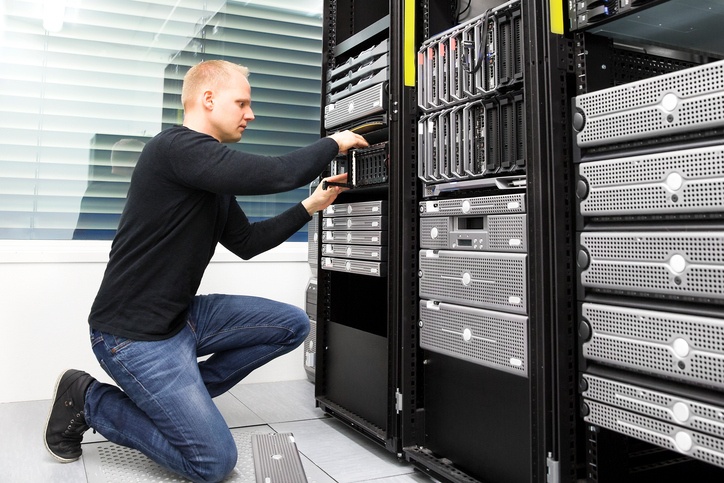
You are having an ordinary day at work when the smell suddenly hits you – that strange burning, electrical smell. You look around and see that a server is smoking and beginning to catch fire.
Before you reach for that fire extinguisher on the wall, though, do you know if it’s the right type for the fire you’re facing? Using the wrong fire extinguisher on an electrical fire like this could, at best, be ineffective and harmful to the equipment, and at worst could actually spread the fire and further endanger you and any in the area.
When it comes to protecting life and property from fire, it is important to understand that different classes of fire require different tools for the fight. When it comes to fire and fire extinguishers, one size certainly does not fit all.
Why Fire Extinguisher Type Matters
Many individuals know where in their buildings or homes, fire extinguishers are located, but few realize that extinguishers are categorized according to the types of fires they can effectively help fight. Using the wrong fire extinguisher for a fire can result in ineffective fire suppression, damaged property, or even harm to or loss of life.
Electrical fires and fires involving computers and sensitive electronic equipment can be especially tricky. Because these are examples of Class C fires (electrical fires), certain extinguishers, like water extinguishers, won’t work at all and could actually make the fire and situation much more dangerous.
In addition to that, if you are dealing with sensitive electronic equipment that are valuable assets to your home or business, such as computers in a server room or data center, you don’t want to be protecting them with just any ABC dry chemical extinguisher either.
While these will be effective for helping put out the fire, most ABC or even BC extinguishers leave a residue behind. This residue will corrode the components of servers and electronics and could essentially be more destructive than the original fire itself.
NOTE: Most fire extinguishers in businesses are ABC dry extinguishers. These fire extinguishers are more than capable of putting out type A, B and C fires which can include fires from wood, paper, liquids, gases and electrical sources like space heaters, computers and microwaves.
However, if you want to protect sensitive electronics in a server room or data center from fire damage, you need to consider getting the right extinguisher for the job.
Class C Clean Agent Fire Extinguishers
There are a number of extinguishers that are especially designed for Class C fires that will be both safe and effective for disrupting the electrical fire and safe to the sensitive electronic equipment. These are often called clean agent fire extinguishers.
Halocarbon-based Fire Extinguishers:
These are perhaps the most ideal choice for server rooms and sensitive electronics and data equipment.
While these types of extinguishers can be used for both Class B and C, and certain ones even for A, they are perfect for use on electronic equipment because they do not leave a residue that could damage the electronic components. Some common halocarbon-based extinguishing agents you may find in fire extinguishers are HCFC-123 (Halotron I) and FE-36 (CleanGuard).
HCFC-123 is a hydrochlorofluorocarbon, gaseous extinguishing agent that is non-conducting and which leaves no residue and is even environmentally safe. The agent is effective for extinguishing a fire because the clean agent chemically reacts with the ignition, fuel and oxygen in the fire to disrupt the chain reaction between them.
FE-36 (HFC-236fa), used in Ansul CleanGuard fire extinguishers, is a hydrofluorocarbon, extinguishing agent that is similar to HCFC-123 but with no ODP (ozone depletion potential). Either of these two clean agents would be good choices in a fire extinguisher for a server room as they are better for the environment if extinguished when compared to Halon 1211.
Halon 1211 Fire Extinguishers:
Halon 1211 is a chlorofluorocarbon, liquified gas that is no longer produced but is still recycled in accordance with The Montreal Protocol for extinguishing fires. Halon 1211 extinguishers are still in use and also effective and safe for use on electronic-based fires. HCFC-123 and FE-36 have begun replacing previous Halon 1211 extinguishers, as it is more environmentally friendly.
Co2 Fire Extinguishers:
CO2 fire extinguishers are another option for use on electrical fires involving sensitive, high-value electrical equipment. It can be used on both Class B or C fires, it leaves no residue, is non-conductive, and is a non-contaminating gas.
The CO2 essentially suffocates the fire, removing oxygen from the area and thus disrupting and extinguishing it. This type of extinguisher is certainly safe for your electronic equipment.
Pros & Cons of Extinguisher Options
When it comes down to it, if you have high-value electronic assets, like server rooms, advanced computer and electronic systems, etc., there really are no cons to choosing a clean agent fire extinguisher over a standard ABC Class dry chemical one.
Not only will the clean agent extinguishers provide safe and effective suppression for an electrical fire, but it will also ensure that your valuable equipment is not damaged in the process.
The only downside would be that the cost of such extinguishers are more than the standard dry chemical ones. It’s important to note that a clean agent fire extinguisher is usually only needed in the server room or data center where the sensitive electronics are housed, while the rest of the office space can be protected with standard ABC dry chemical fire extinguishers.
Ultimately, when considering the cost of irreparable damage that a dry chemical extinguisher will do to your sensitive electronics, the cost of the extinguishers becomes a moot point.
Talk to the Experts at Koorsen
Still not sure whether you have the best fire extinguishers for proper electronic and computer fire protection? Give the experts at Koorsen a call or contact them online to learn more and ensure you have the best protection for your home or workplace.




